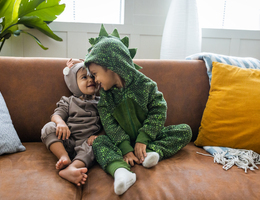 Toddlers don't always have a reputation for empathy. Imagining how someone else is feeling is a complex skill that's learned over many years. But you are your child's first teacher—and lessons in healthy emotional behavior can begin early. What's more, day-to-day activities offer plenty of natural opportunities.
Toddlers don't always have a reputation for empathy. Imagining how someone else is feeling is a complex skill that's learned over many years. But you are your child's first teacher—and lessons in healthy emotional behavior can begin early. What's more, day-to-day activities offer plenty of natural opportunities.
These seven simple strategies are a great place to start.
1. Name your child's big feelings. Help your toddler recognize their emotions by giving a verbal play-by-play. If your toddler is upset about leaving the playground, you might say, "Are you mad that it's time to go home? I understand. The playground is fun. It's time to leave, but we'll come back tomorrow." Labeling feelings can help kids learn how to cope with them.
2. Talk about how others feel. Help your child notice the emotions of others. Point out when a friend is sad because they want to play with a toy that isn't being shared. Comment on how happy Grandma is when you come for a visit.
3. Talk about your feelings with "I" statements. Show self-awareness by sharing your own emotions. Keep your explanations simple: Try "I don't like when you hit me. It hurts," or "I feel happy when the toys are cleaned up."
4. Be a good role model. Your toddler pays attention to how you interact with others. Be kind and caring!
5. Brainstorm ways to show empathy. Think together about how you and your child can help when someone is having a hard time. When someone is hurt, say, "What can we do for Lily's booboo?" If your toddler isn't sure, offer ideas like getting ice or giving a hug.
6. Read books about feelings. There are many children's books about emotions. Talk about characters' feelings in other stories too. For instance, "How do you think the boy feels when his mommy has to leave for work?"
7. Respect your child's limits. For example, stop tickling your child if they don't like it, and don't make your child hug or kiss someone if they don't want to. Honoring your child's boundaries is a way to say, "How you feel matters." Over time, that will teach them that the feelings of others matter too.
Source: Child Mind Institute; Zero to Three
Reviewed 8/31/2023